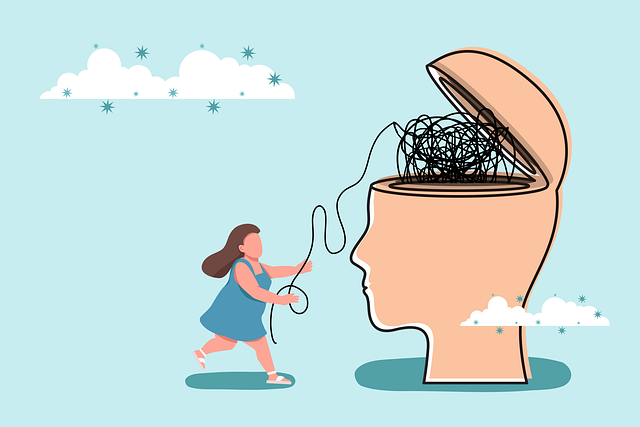Colorado Springs Couples Counseling Therapy leverages positive thinking as a powerful tool for fostering harmonious relationships through improved communication, emotional well-being, and conflict resolution. By creating a safe, supportive environment, encouraging gratitude journaling, and offering ongoing support, this therapy helps individuals transform negative thought patterns into optimism, enhancing personal and professional connections while promoting stress management, depression prevention, and overall life satisfaction.
“Unleash the power of positivity with our comprehensive guide, tailored for individuals seeking a transformative experience in Colorado Springs couples counseling therapy. This article delves into the science-backed benefits of positive thinking and its profound impact on interpersonal connections. From preparing a safe haven for self-reflection to a detailed step-by-step exercise implementation, we equip you with tools to cultivate optimism. Learn how post-exercise reflection can anchor positivity in daily life, fostering healthier relationships and enhancing overall well-being.”
- Understanding Positive Thinking and Its Impact on Relationships
- Preparing for the Exercise: Setting a Safe and Supportive Environment
- The Step-by-Step Guide to Implementing the Positive Thinking Exercise
- Post-Exercise Reflection and Integrating Positivity into Daily Life
Understanding Positive Thinking and Its Impact on Relationships

Positive thinking is a powerful tool that can significantly impact an individual’s relationships and overall well-being. In the context of Colorado Springs couples counseling therapy, fostering a positive mindset is often a central focus. When individuals bring a positive perspective to their interactions, it creates a more harmonious environment, enhancing communication and strengthening bonds. This practice involves recognizing and challenging negative thought patterns, replacing them with constructive alternatives, and adopting a optimism that promotes emotional well-being promotion techniques.
By integrating positive thinking into daily routines through self-care routine development for better mental health, individuals can improve their relationships both personally and professionally. It allows for better conflict resolution, increased empathy, and stronger social skills training, ultimately leading to more fulfilling connections. This transformation can be a game-changer in couples counseling, helping partners navigate challenges with newfound resilience and understanding.
Preparing for the Exercise: Setting a Safe and Supportive Environment

Preparing for a positive thinking exercise is akin to setting the stage for a successful theater performance—a safe and supportive environment is crucial. When implementing such an initiative, whether it’s a group session or individual therapy, Colorado Springs Couples Counseling Therapy practices recommend establishing a private, quiet space free from distractions. This environment should foster openness and encourage participants to share their thoughts and experiences without fear of judgment.
Creating a welcoming atmosphere involves not only ensuring physical comfort but also cultivating emotional safety. Trained therapists can facilitate this by setting clear boundaries, explaining the exercise’s purpose, and assuring confidentiality. Such measures build trust, making it easier for individuals to engage in activities that promote stress management and even depression prevention, ultimately enhancing their overall well-being.
The Step-by-Step Guide to Implementing the Positive Thinking Exercise

Implementing a positive thinking exercise can transform lives, and for those seeking professional support, Colorado Springs Couples Counseling Therapy offers a structured approach. Here’s a step-by-step guide to help you navigate this process effectively:
1. Identify the Objective: Begin by defining the primary goal of the exercise, whether it’s stress reduction, improving relationships, or cultivating resilience. For instance, if you’re part of a Community Outreach Program Implementation, understand how positive thinking can enhance overall well-being and community engagement.
2. Create a Safe Space: Establish an environment conducive to reflection and openness. This could be a quiet room in your home or a designated counseling space where individuals feel comfortable sharing their thoughts. For those accessing Trauma Support Services, ensuring sensitivity and confidentiality is paramount.
3. Choose the Right Techniques: Offer a variety of positive thinking exercises like gratitude journaling, affirmation practices, or guided meditation. Tailor these activities to cater to different preferences and needs.
4. Provide Clear Instructions: Break down each exercise into manageable steps. For example, guide participants through a simple gratitude ritual: write down three things they’re thankful for daily. This reduces the initial learning curve, making it easier for everyone to engage.
5. Encourage Consistency: Emphasize the importance of regular practice. Consistent application strengthens positive thinking habits, leading to more significant and lasting benefits. Encourage participants to set aside dedicated time each day or week for their exercises.
6. Offer Supportive Guidance: Be available to answer questions and provide encouragement throughout the process. This could involve one-on-one sessions or group debriefs where individuals share their experiences and challenges.
Post-Exercise Reflection and Integrating Positivity into Daily Life

After engaging in a positive thinking exercise, taking time for post-exercise reflection is essential. This process involves reviewing and analyzing one’s thoughts, emotions, and experiences during the practice. Individuals can consider what aspects of their mindset shifted, any challenges faced, and the overall impact on their well-being. By reflecting, they reinforce the benefits gained from the exercise, making it easier to integrate positivity into daily life.
Incorporating a regular positive thinking routine requires commitment and consistency. It is beneficial to set aside dedicated time each day for exercises like gratitude journaling, mindful meditation, or cognitive reframing. Colorado Springs couples counseling therapy can offer valuable support in this journey, providing strategies to manage anxiety relief and reduce the mental illness stigma while cultivating compassion within individuals and their relationships. This daily practice will help foster a more optimistic outlook, improve coping mechanisms, and enhance overall life satisfaction.
Positive thinking exercises, such as those practiced in Colorado Springs Couples Counseling Therapy, offer a powerful tool for enhancing relationships and overall well-being. By creating a safe space and following a structured guide, individuals can unlock the transformative power of positivity. This article has provided a comprehensive framework for implementing these practices, from understanding their impact to post-exercise reflection. Integrating positive thinking into daily life can lead to healthier connections, improved communication, and increased happiness, making it a valuable asset for anyone seeking to strengthen their relationships.













